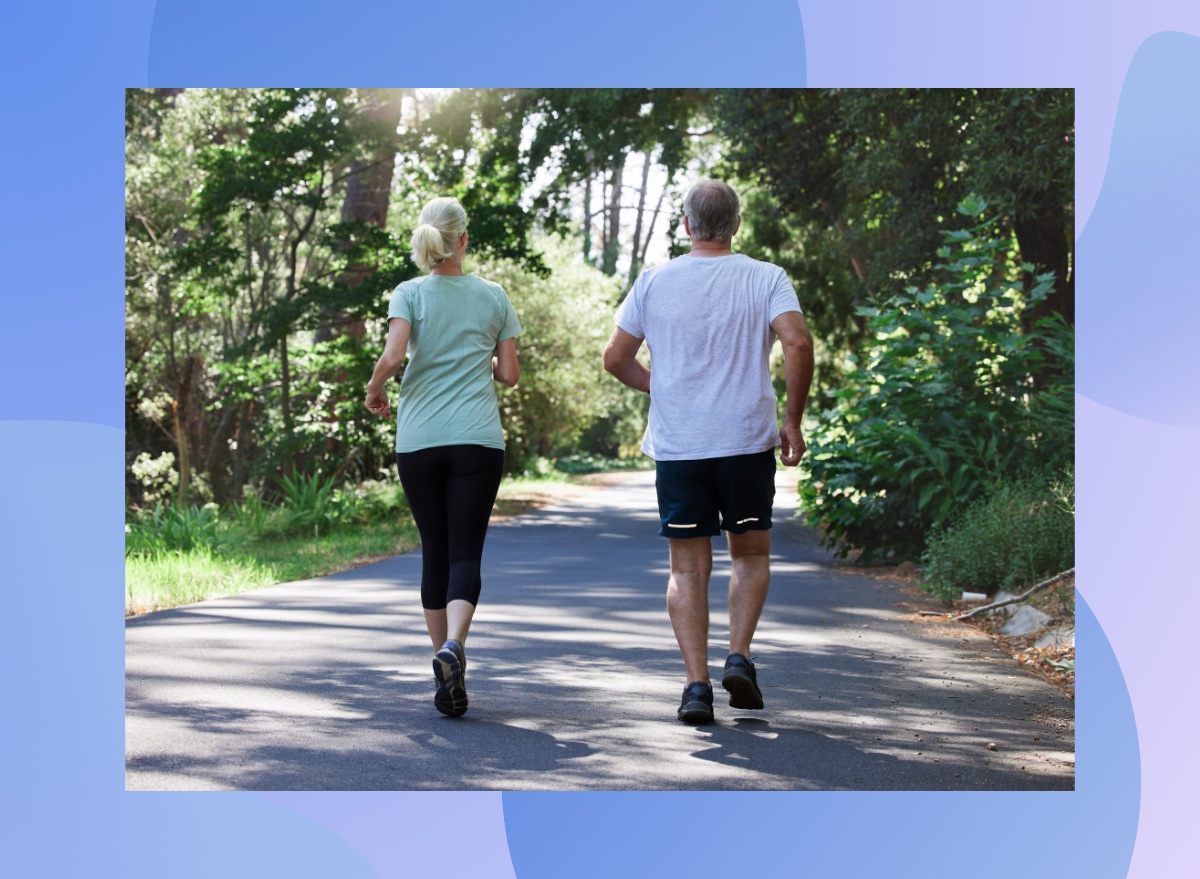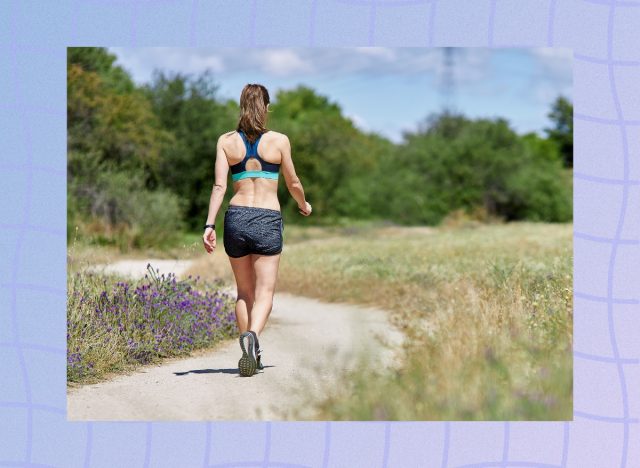Walking This Way Can Add 20 Years to Your Life, Says Top Scientist

Tom Yates, Ph.D., MSc, BSc, a professor at the UK's University of Leicester, gained a lot of attention in March of this year when he and his colleagues from the National Institute for Health Research (NIHR) Leicester Biomedical Research Centre published a study in the International Journal of Obesity revealing that people who walk slowly are up to four times more likely to die from severe cases of COVID-19—and have more than double the chance of contracting severe cases of the virus—than their brisk-walking counterparts.
By then, the leading scientists knew that factors such as obesity and body-mass were key risk predictors of how well we cope with the virus, but the study was the first to shed light on the connection between fitness levels and COVID.
Related: One Body Part You Never Exercise But Should, Say Experts
"Fast walkers have been shown to generally have good cardiovascular and heart health, making them more resilient to external stressors, including viral infection, but this hypothesis has not yet been established for infectious disease," Yates explained when the study was released. "It is my view that … research surveillance studies should consider incorporating simple measures of physical fitness, such as self-reported walking pace in addition to BMI, as potential risk predictors of COVID-19 outcomes that could ultimately enable better prevention methods that save lives."
For people who walk, the study was yet another compelling reason—to add to the ever-growing pile of research—that suggests brisk walking is a worthwhile form of exercise with a number of benefits for your body. However, in a newly published interview with The Daily Mail, professor Yates offered perhaps the single biggest reason yet why you should take more brisk walks every day.
"Fast walkers can live up to 20 years longer," Yates told The Daily Mail. "It improves cardiovascular fitness, which is a measure of how efficient your heart is, and your ability to utilize oxygen, which is an indicator of fitness."
Several studies back him up. For example, a big study published in 2015 in The American Journal of Clinical Nutrition found that a brisk 20-minute walk every day could reduce your risk of death by upwards of 30%.
Even if you're not brisk walking, you can reap some of the benefits of walking more. As William Kraus, MD, a professor at the Duke University Molecular Physiology Institute, once revealed to The New York Times how "the little things people do every day"—such as walking while shopping and climbing escalators—"can and do add up and affect the risk for disease and death." Kraus oversaw an eye-opening study published in 2018 that found that those who move around for small periods, and lightly exercised for fewer than 20 minutes every day, had a much lower chance of dying earlier.
For the record, brisk walking is generally defined as walking fast enough that your breathing becomes heavier, and while you can talk, you can't sing. (To know if you're walking fast enough, see here for the "Perceived Exertion Scale.")
Now, if adding a couple of decades to your life isn't enough to get you out there marching more, here are just a few more added benefits of brisk walking for you to consider. And for other ways to increase the intensity of your walks, see Why This Crazy-Popular Walking Workout Totally Works, Say Experts.
You'll Be Smarter

Scientists have linked brisk walking, along with other forms of moderate exercise—which are defined by The Cleveland Clinic as exercise that essentially doubles your heart rate—with a fertile brain and better cognitive performance. One study, published by APA PsycNet, found that exercising more is associated with the creation successful innovations. (After all, some of history's greatest thinkers, from Plato to Steve Jobs, were committed walkers.) And for more reasons to walk, read about The One Major Side Effect of Going for a Single 1-Hour Walk, Says New Study.
You'll Sleep Better

Scientists have shown that taking a brisk, early morning walk outside is crucial for resetting your biological clock every day and ensuring that you get sounder sleep later on.
You'll Be Less Stressed

No shocker here. But according to The Mayo Clinic, brisk walking can ease symptoms associated with depression and anxiety by releasing endorphins (which will "enhance your sense of wellbeing"), distract your mind, help you build confidence ("meeting exercise goals or challenges, even small ones, can boost your self-confidence"), and help you cope ("doing something positive to manage depression or anxiety is a healthy coping strategy").
You'll Burn Calories

Generally speaking, a 20-minute brisk walk should require you roughly 2,000 to 3,000 steps, which will carry you the distance of roughly one mile, and will result in 90 to 110 calories burned. Walk longer, and more frequently, and walking can indeed help you lose more weight. If you'd really like to burn fat while walking, see here for The 30-Second Trick to Losing More Weight While Walking.








